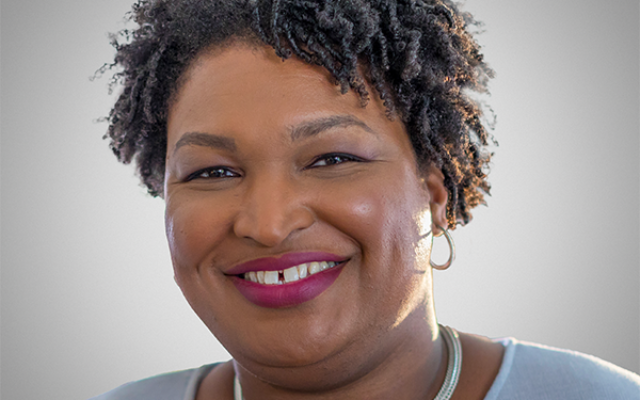Kemp-Abrams Rematch Among Marquee Races
Economy, voting laws, and abortion among central issues in gubernatorial contest.
Dave Schechter is a veteran journalist whose career includes writing and producing reports from Israel and elsewhere in the Middle East.
Republican Brian Kemp won the keys to the governor’s mansion in 2018, narrowly defeating former Democratic state House minority leader Stacey Abrams, 50.2 percent to 48.8 percent.
Kemp is betting that in 2022 the state’s economic health will win him a second term, while Abrams wagers that such issues as abortion and health care will resonate with voters.
Georgia law requires that the winner of an election receive the majority of the votes cast. If the race is close, votes received by Libertarian Shane Hazel could force a Dec. 6 runoff. Polls conducted in October placed Kemp ahead of Abrams, on average by several percentage points.
The state’s economy has been buoyed by a low unemployment rate, a boost in tax collections, and $4.8 billion that Georgia received from the $1.9 trillion American Rescue Plan — a measure that congressional Democrats passed without Republican support and that Kemp derided.

Kemp and Abrams have offered plans to take advantage of the state’s $6.57 billion budget surplus in fiscal 2022.
Kemp has proposed a $1 billion income tax refund and $1 billion in property tax relief. Both would require approval when the General Assembly, where Republicans currently hold House and Senate majorities, reconvenes in January 2023.
Georgia law gives the governor authority to distribute the federal COVID-19 funds. The Atlanta Journal-Constitution reported in mid-October that Kemp had allocated all but $150 million of the $4.8 billion. His plans included spending $1.2 billion in federal aid to support some three million Georgians who benefit from Medicaid, the federal health insurance program for low-income individuals and families, and people served by other state and federal assistance programs.
Georgia is one of a dozen states that does not fully fund Medicaid through the Affordable Care Act. Advocates for expansion say that 14.5 percent of Georgians are without health insurance, tied for second worst among the states. Kemp has been at odds with the Biden administration, which has blocked the governor’s plan for a limited expansion of Medicaid (serving about 50,000 people) for those willing to meet such conditions as a work requirement.

Kemp also announced plans to spend federal funds on increased police pay, broadband internet, sewer projects, and at Grady Memorial Hospital, in the wake of the announced closing of the Wellstar Atlanta Medical Center.
Georgia’s unemployment rate for August was measured at 2.8 percent. Kemp frequently touts job development, such as plans announced by Rivian and Hyundai to site electric vehicle manufacturing plants in the state, generating a potential 15,000 jobs.
Abrams has proposed a $1 billion income tax rebate, limited to families with household incomes of less than $250,000 a year. She proposes spending $1.9 billion of the surplus to fully expand Medicaid (providing coverage to upwards of 400,000 uninsured Georgians) and to boost pay for teachers and police. Abrams favors spending more to aid technical college programs, small businesses, and rural Georgia, which has suffered a spate of hospital closings.
Abrams has backed casino gambling as a way to support the state’s popular HOPE scholarship fund, an initiative that would require voter approval of a constitutional amendment.
In response to the June ruling by the U.S. Supreme Court that there is no constitutional right to abortion, Abrams has made abortion rights a key plank in her campaign. Georgia’s current abortion law, which Kemp signed in 2019, prohibits abortions after six weeks of pregnancy, which can be before a woman knows that she is pregnant. The state previously allowed abortions up to 20 weeks. The current law includes exceptions if the health of the mother is endangered, or in cases of rape or incest, if a police report has been filed.
Kemp has defended and Abrams has opposed changes made to voting rules and procedures by the Republican-controlled legislature in the wake of the 2020 presidential election and disproven allegations of widespread fraud.
Speaking to the Republican Jewish Coalition in September, Kemp boasted that Georgia holds $25 million in Israel bonds. He also lauded the state’s anti-BDS (Boycott, Divestment and Sanctions) law. A federal district judge has said that the law violates free speech provisions of the Constitution, but the state has appealed to the federal Court of Appeals. The BDS movement seeks to employ economic pressure to force a change in Israeli policies regarding the Palestinian Arabs.
Abrams has stated opposition to the BDS movement, though she voted in 2016 against the state’s initial anti-BDS law (which was amended in 2022), on grounds that banning boycotts is unconstitutional, noting their effectiveness in the American civil rights movement.
Abrams opposes using tax credits and vouchers to support private schools, contending that such programs take funding away from public schools. The state’s Student Scholarship Organization has proven a popular means of aiding Jewish day schools. In 2022, the state provided $100 million in tax credits to those making qualified donations to private school scholarships. In April, Kemp signed legislation that would increase that pool of tax credits to $120 million.
According to the most recent data posted by the Georgia Campaign Finance System, Abrams had raised $36.7 million and spent $37.3 million. Kemp had received $38.9 million in contributions, spent $27.7 million, and had $11.1 million available.
- voters guide
- politics
- Dave Schechter
- Brian Kemp
- governor
- Stacey Abrams
- Abortion
- Health Care
- Shane Hazel
- American Rescue Plan
- General Assembly
- Atlanta Journal Constitution
- Affordable Care Act
- Medicaid
- Grady Memorial Hospital
- WellStar Atlanta Medical Center
- Rivian
- Hyundai
- HOPE scholarship fund
- U.S. Supreme Court
- Republican Jewish Coalition
- Boycott
- Divestment and Sanctions
- Student Scholarship Organization
- Georgia Campaign Finance System




comments